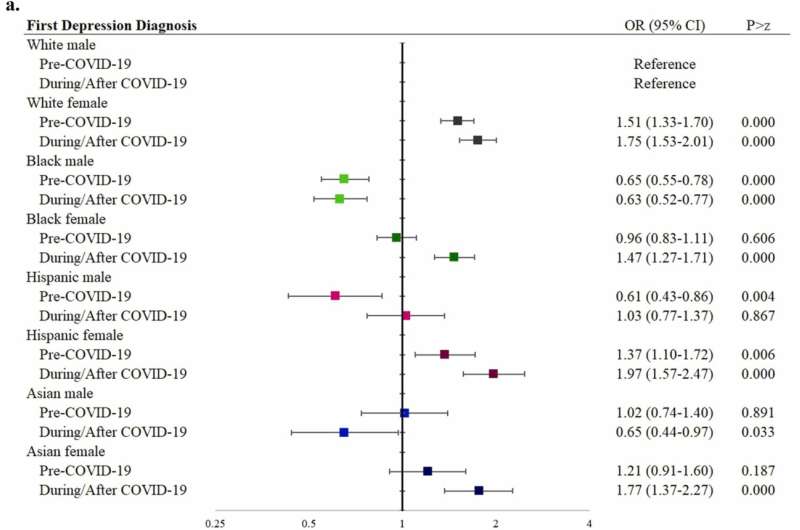This article has been reviewed according to Science X's editorial process and policies. Editors have highlighted the following attributes while ensuring the content's credibility:
fact-checked
peer-reviewed publication
trusted source
proofread
Study shows negative impact of COVID-19 pandemic on youth minority mental health

Recent historical, political, and public health events, most notably the COVID-19 pandemic, have collectively contributed to increased stress and mental health challenges among many groups of people—including adolescents in racial and ethnic minorities.
In a study published in Academic Pediatrics, Johns Hopkins Children's Center researchers investigated the pandemic's effect on preexisting mental health disparities among youth, and found rates of depression, anxiety, and suicidal thoughts and behaviors significantly increased during the pandemic and in the post-pandemic period, especially among Black, Asian and Hispanic females.
"Our findings show this is a real problem that we need to address on all fronts urgently," says Laura Prichett, Ph.D., M.H.S., the first author of the study, an assistant professor in general pediatrics at the Johns Hopkins University School of Medicine and a Building Interdisciplinary Research Careers in Women's Health Scholar at the Johns Hopkins Institute for Clinical and Translational Research.
Using electronic medical record data from Johns Hopkins Community Physicians, a health care system with 40 locations throughout Maryland, researchers evaluated changes in annual rates of depression, anxiety, and suicide risk-related diagnoses among 29,117 adolescents ranging in age from 8 to 20. Researchers organized participants into subgroups based on gender, race, and ethnicity—Asian, Black, Hispanic, and white young males and females.
The researchers found that almost all racial and gender subgroups had significantly higher rates of depression and anxiety after the start of the pandemic compared to the years prior. Data shows rates of anxiety significantly increased—especially among Asian females, who saw a 136% increase (25.4 to 59.9 out of 1,000). In addition, rates of depression rose substantially among all subgroups, with the highest rates among females across all racial groups.
Hispanic males had a 190% increase in rates of depression (12.1 to 35.1 out of 1,000). Researchers also found suicidal thoughts and behaviors substantially increased among all subgroups—most notably female subgroups, with the largest increases among Asian females, who saw a 171% increase (2.8 to 7.5 out of 1,000), and Black females, who had a 90.2% increase (5.1 to 9.7 out of 1,000).
The study authors note there are specific stressors and sociocultural constructs unique to each of the subgroups that are contributing to these mental health trends seen among adolescents. In addition to the stress caused by isolation from peers, economic concerns, and health worries directly related to the COVID-19 pandemic, many of these subgroups have also experienced racism-specific stress.
However, the study authors note these trends could also reflect better identification of mental health indicators, increased willingness to ask practitioners for help, or more openness to discuss mental health concerns.
"These trends we are seeing, I think, are a combination of good things—like doctors noticing more that kids need help, and then really bad things having to do with the COVID-19 pandemic, isolation from peers, racism, and financial stress," says Prichett. "No matter what, it is clear that these past few years have significantly impacted young people's mental health. This is a serious problem, and we need to take urgent action."
Prichett and the other investigators believe there are important next steps to address the concern, including universal screening of youth in school and in primary care, broadening understanding of effective treatment and support options for patients and practitioners, and more funding for mental health support services for young people and their families at school, work, and home.
More information: Laura M. Prichett et al, COVID-19 and Youth Mental Health Disparities: Intersectional Trends in Depression, Anxiety and Suicide Risk-Related Diagnoses, Academic Pediatrics (2024). DOI: 10.1016/j.acap.2024.01.021




















